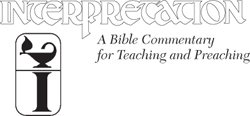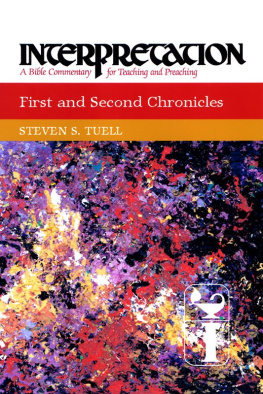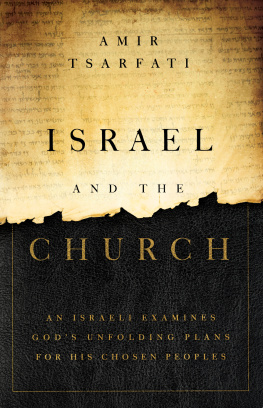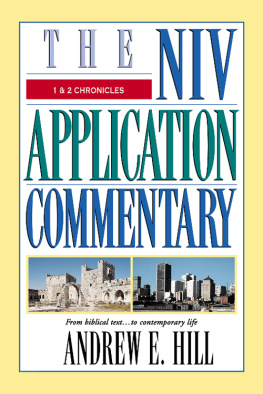First and Second Chronicles
INTERPRETATION
A Bible Commentary for Teaching and Preaching
INTERPRETATION
A BIBLE COMMENTARY FOR TEACHING AND PREACHING
James Luther Mays, Editor
Patrick D. Miller Jr., Old Testament Editor
Paul J. Achtemeier, New Testament Editor
Old Testament: | Genesis by Walter Brueggemann |
Exodus by Terence E. Fretheim |
Leviticus by Samuel E. Balentine |
Numbers by Dennis T. Olson |
Deuteronomy by Patrick D. Miller |
Joshua by Jerome F. D. Creach |
Judges by J. Clinton McCann |
Ruth by Katharine Doob Sakenfeld |
First and Second Samuel by Walter Brueggemann |
First and Second Kings by Richard D. Nelson |
First and Second Chronicles by Steven S. Tuell |
EzraNehemiah by Mark A. Throntveit |
Esther by Carol M. Bechtel |
Job by J. Gerald Janzen |
Psalms by James L. Mays |
Proverbs by Leo G. Perdue |
Ecclesiastes by William P. Brown |
Song of Songs by Robert W. Jenson |
Isaiah 139 by Christopher R. Seitz |
Isaiah 4066 by Paul D. Hanson |
Jeremiah by R.E.Clements |
Lamentations by F. W. Dobbs-Allsopp |
Ezekiel by Joseph Blenkinsopp |
Daniel by W. Sibley Towner |
HoseaMicah by James Limburg |
NahumMalachi by Elizabeth Achtemeier |
New Testament: | Matthew by Douglas R. A. Hare |
Mark by Lamar Williamson Jr. |
Luke by Fred B.Craddock |
John by Gerard S. Sloyan |
Acts by William H. Willimon |
Romans by Paul J. Achtemeier |
First Corinthians by Richard B. Hays |
Second Corinthians by Ernest Best |
Galatians by Charles Cousar |
Ephesians, Colossians, and Philemon by Ralph. P. Martin |
Philippians by Fred B. Craddock |
First and Second Thessalonians by Beverly Roberts Gaventa |
First and Second Timothy and Titus by Thomas C. Oden |
Hebrews by Thomas G. Long |
First and Second Peter, James, and Jude by Pheme Perkins |
First, Second, and Third John by D. Moody Smith |
Revelation by M. Eugene Boring |
STEVEN S. TUELL
First and Second
Chronicles


2001 Steven S. Tuell
2012 paperback edition
Originally published in hardback in the United States
by John Knox Press in 2001
Louisville, Kentucky
12 13 14 15 16 17 18 19 20 2110 9 8 7 6 5 4 3 2 1
All rights reserved. No part of this book may be reproduced or transmitted in any form or by any means, electronic or mechanical, including photocopying, recording, or by any information storage or retrieval system, without permission in writing from the publisher. For information, address Westminster John Knox Press, 100 Witherspoon Street, Louisville, Kentucky 40202-1396. Or contact us online at www.wjkbooks.com.
Scripture quotations from the New Revised Standard Version of the Bible are copyright 1989 by the Division of Christian Education of the National Council of the Churches of Christ in the U.S.A. and are used by permission.
Comments on the Psalms are adapted from Praising God and Responding to God by Steven Tuell in Adult Bible Studies Teacher 1996 Cokesbury. Used by permission. All rights reserved.
Library of Congress Cataloging-in-Publication Data
A catalog record for this book is available from the Library of Congress.
ISBN-13: 978-0-8042-3110-7
ISBN-10: 0-8042-3110-9
ISBN: 978-0-664-23865-0 (paper edition)
 The paper used in this publication meets the minimum requirements of the American National Standard for Information SciencesPermanence of Paper for Printed Library Materials, ANSI Z39.48-1992.
The paper used in this publication meets the minimum requirements of the American National Standard for Information SciencesPermanence of Paper for Printed Library Materials, ANSI Z39.48-1992.
SERIES PREFACE
This series of commentaries offers an interpretation of the books of the Bible. It is designed to meet the need of students, teachers, ministers, and priests for a contemporary expository commentary. These volumes will not replace the historical critical commentary or homiletical aids to preaching. The purpose of this series is rather to provide a third kind of resource, a commentary which presents the integrated result of historical and theological work with the biblical text.
An interpretation in the full sense of the term involves a text, an interpreter, and someone for whom the interpretation is made. Here, the text is what stands written in the Bible in its full identity as literature from the time of the prophets and apostles, the literature which is read to inform, inspire, and guide the life of faith. The interpreters are scholars who seek to create an interpretation which is both faithful to the text and useful to the church. The series is written for those who teach, preach, and study the Bible in the community of faith.
The comment generally takes the form of expository essays. It is planned and written in the light of the needs and questions which arise in the use of the Bible as Holy Scripture. The insights and results of contemporary scholarly research are used for the sake of the exposition. The commentators write as exegetes and theologians. The task which they undertake is both to deal with what the texts say and to discern their meaning for faith and life. The exposition is the unified work of one interpreter.
The text on which the comment is based is the Revised Standard Version of the Bible and, since its appearance, the New Revised Standard Version. The general availability of these translations makes the printing of a text in the commentary unnecessary. The commentators have also had other current versions in view as they worked and refer to their readings where it is helpful. The text is divided into sections appropriate to the particular book; comment deals with passages as a whole, rather than proceeding word by word, or verse by verse.
Writers have planned their volumes in light of the requirements set by the exposition of the book assigned to them. Biblical books differ in character, content, and arrangement. They also differ in the way they have been and are used in the liturgy, thought, and devotion of the church. The distinctiveness and use of particular books have been taken into account in decisions about the approach, emphasis, and use of space in the commentaries. The goal has been to allow writers to develop the format which provides for the best presentation of their interpretation.
The result, writers and editors hope, is a commentary which both explains and applies, an interpretation which deals with both the meaning and the significance of biblical texts. Each commentary reflects, of course, the writers own approach and perception of the church and world. It could and should not be otherwise. Every interpretation of any kind is individual in that sense; it is one reading of the text. But all who work at the interpretation of Scripture in the church need the help and stimulation of a colleagues reading and understanding of the text. If these volumes serve and encourage interpretation in that way, their preparation and publication will realize their purpose.
Next page














 The paper used in this publication meets the minimum requirements of the American National Standard for Information SciencesPermanence of Paper for Printed Library Materials, ANSI Z39.48-1992.
The paper used in this publication meets the minimum requirements of the American National Standard for Information SciencesPermanence of Paper for Printed Library Materials, ANSI Z39.48-1992.